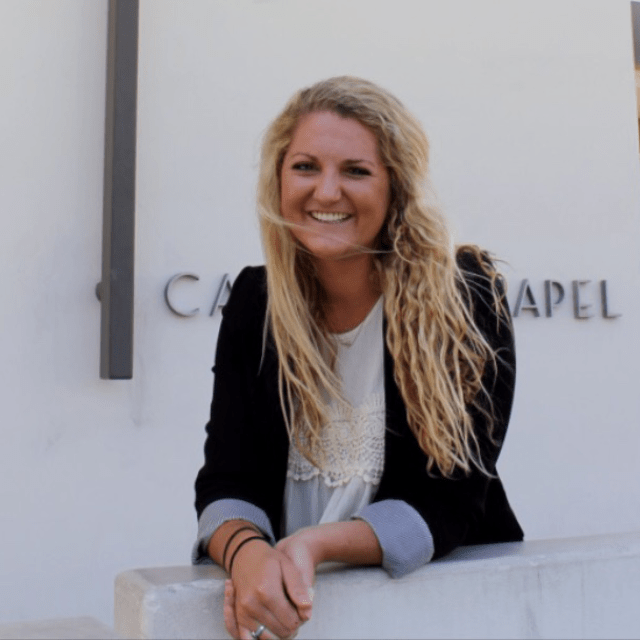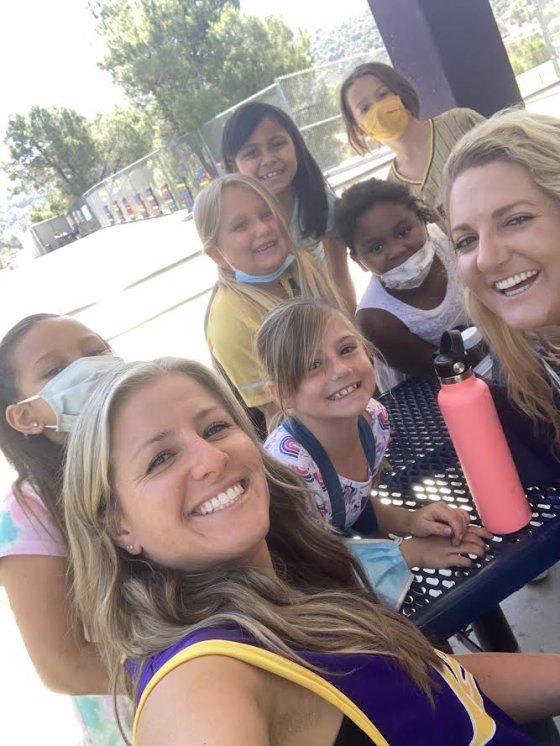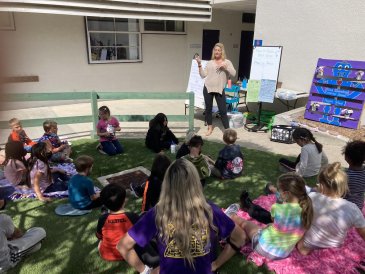
Flashback to January 2020 … Angie Winkler, who's attending PLNU to obtain her M.A. in Education and a Counseling and Guidance, Pupil Personnel Services Credential, was on a plane traveling to Gold Coast, Australia.
Two months before the COVID-19 pandemic hit, Winkler traded in the San Diego sun for a holiday down under. She thought a change of scenery and pace would give her clarity on what her calling should be.
Coming from a line of family in helping professions — doctors, nurses, and teachers — Winkler knew she wanted to incorporate some of that into her career. “It shaped my view on working and what I wanted to make my purpose — to have a fulfilling role.”
Winkler initially felt called to be a special education teacher after a positive experience mentoring a child with intellectual disabilities at her church, and spent some time doing instructional aid. She fell in love with the students but ultimately decided she wanted to give less homework and be more relational instead. This was Winkler’s impasse when she left for Australia.
“God was working on my heart on things I had to go through to develop qualities that I would need as a school counselor.”

“I thought I was gonna be there for five months,” Winkler said. “I had my working holiday visa, I had a place to live, and then COVID hit two months in. So I had to come back, which I was super bummed about, but in hindsight, God worked it all out for a reason.”
Although her trip was cut short, she got what she came for: clarity. “Empathy, compassion, and listening skills. He grew in me during that season and [revealed] how that would relate to a career,” she revealed. “God was working on my heart on things I had to go through [to develop] qualities that I would need as a school counselor.”
Once back in the United States, Winkler stumbled upon her former high school counselor online. The idea of a counselor as a career had never crossed her mind previously, but suddenly it piqued her interest and she decided to give the counselor a call. After sharing a bit about her fulfilling 20-year career, the former high school counselor encouraged her to go back to school — “what led me on my journey,” said Winkler.
For both her fall and spring internships, Winkler was paired with a veteran counselor through PLNU’s master’s program, which would serve as an unforgettable experience.
Winkler was able to forge bonds with kids at an El Cajon elementary school during her fall internship as well as middle school students in Poway during her spring internship. “The kids were amazing and they clung to anyone who was there for a while,” she said.
“They were drawn to me and I built really great relationships with all of them.”
Having a variety of field experience helped Winkler hone in on an interest in working at an elementary school. The reason being, according to Winkler, was the elementary school student age range allows for more focus on the emotional development of a child, which aligns most with her calling.
Shadowing her site supervisors, Winkler was able to get experience that can’t be taught in a class. “We built a lot of guidance lessons where you go into the classroom and teach on something like self-esteem or positive thinking or respecting others.”
Winkler elaborated on one of her more poignant relationships: “This one girl was having a really hard time. It was a Title 1 school, so a lower income area. A lot of the parents [had situations] where they were in jail or rehab, and grandparents, aunts, uncles, and friends were raising these kids.”

“You could see how it affected these kids and their behavior in class,” Winkler continued. “And so the counselor would go in and pull them out if they were having a hard day and just talk them through things … give them a safe place to come.”
“Building that relationship with them is so important. I love to be able to make a difference and help them learn from my mistakes, and set them on a good track for their futures.”
Being entrusted with an individual caseload of about 20 students she’d meet with weekly, Winkler’s passion for counseling was further solidified. “Building that relationship with them is so important. I love to be able to make a difference and help them learn from my mistakes, and set them on a good track for their futures.”
Winkler recalls one particular child, saying in a chuckle: “She was always lying. So we'd work on honesty lessons each week.”
This same child opened up to Winkler a lot while she was there. “We built that connection and she opened up a lot too. Her mom was in rehab, the dad’s not in the picture, and she’s being raised by her aunt and uncle. She has had a really hard life, especially at eight and [we’re] trying [to help her] navigate this.”
Winkler is in contact with the fall site supervisor still, who shared with her that this same little girl always asks about her. She would tell the counselor, “When’s Miss Angie coming back?” This pulled at Winkler’s heartstrings. “I miss her. She was so sweet,” she said.
The internship experience
Internships are a chance to take what you’ve learned in a master’s program and put it into practice.
“I am learning so much in person. You learn online [through the program], but only so much until you experience it yourself. Getting that hands-on experience shadowing a counselor and learning from them and watching them with students is amazing.”
“The [counselor] I’m with now in middle school is incredible,” Winkler continued. “She’s so compassionate and these kids go through really hard things, like suicidal thoughts or losing their parents. She makes them feel so comfortable, at ease, and safe.”
By hands-on learning and seeing the day-to-day of a counselor, you can “actually see the impact they make in these kids' lives.”
The professors used their classes to prepare students for their onsite experiences. “You can’t fully learn it until you’re experiencing it yourself. You’re thrown in, with guidance and support of course, but that’s the best way to learn,” said Winkler. “The professors were awesome. They would try to relate [the curriculum] to actual counseling experiences and things we're going to encounter. They always try to relate it to real-world situations.”
It’s beneficial to learn not only from your school experience, but also from the others in the program. In the classes, Winkler said real-life examples would come up in conversation. “They’ll go over scenarios — even like injustices — at their schools where teachers have said insensitive or racial comments,” Winkler said.
“You can’t fully learn it until you’re experiencing it yourself. You’re thrown in, with guidance and support of course, but that’s the best way to learn.”
When it comes to the type of counselor Winkler hopes to be upon graduating, she said Tami Johnson, District Counselor at Cajon Valley Union School District, is a prime example.
“To see the work she does for the counselors, [how] she advocates for them but also for counseling programs and professional development, he shows people the importance and value of counselors. And she’s implemented additional resources for military families, students with divorced families. There’s these kits and resources she gives to those students too.”
Another teacher who’s made a vast impact on Winkler’s experience is her seminar teacher, Ann Rossier.

“She has been amazing. In class, folks talk about everyone’s different scenarios they’ve gone through to get her advice. She's just very empathetic. And seeing her wisdom and her experience in the field … it's been really good to learn from.”
“He would take the time to pour into the students and guide us through, which really set me up for success so that I’m fast tracking.”
PLNU associate professor and director of assessment and accreditation Michael Corke, Ph.D., has also been paramount to her education experience. “Working through my research paper [was hard because] it was all new for me, but he made me like it.”
Winkler’s thesis deals with health education in middle school: “their knowledge base at this point and how that impacts their daily habits, academic performance, their motivation in school, their attitudes, and mental health and relationships with peers.”
Corke’s help has also made it possible for Winkler to be able to make a plan to graduate early. “He was there every step of the way,” she said. “He would take the time to pour into the students and guide us through, which really set me up for success so that I’m fast tracking.”
“It's been quite a journey, but I’m so thankful for it.”
Reflecting on her experience in the master’s program, Winkler said, “It's been quite a journey, but I’m so thankful for it.”
Growing up in a predominantly upper-middle-class area of North County, the chance to put herself in the shoes of kids from a different walk of life than what she grew up with was extremely beneficial for her capacity to empathize with her students. “I learned a lot about the disparity there is where [some kids] don’t have access to the resources that other kids have.”
At the middle school where she’s been interning this spring, the curriculum has centered around teaching students the difference between equity and equality. “[We talked about] people having different circumstances and not having the same access to resources. You're making students aware of that and how we can kind of bridge that gap.”
This lesson of being able to see another’s point of view is something she wants to bring into her career as a counselor.
“Counselors make a huge difference in a lot of students’ lives. That is another life you’ve helped and you’ve changed the trajectory of their future.”
“I think it’s important to teach students too, [that some students] don’t have that access to resources. You’re wired when you’re growing up to only think about yourself. We have to be taught how to not be selfish.”
Being alert to the realities some students face is something Winkler strives to bring into her future practice to better impact the lives of students. Whether helping with tutoring or issues with money, Winkler envisions being the person students can turn to for that extra support.
“Counselors make a huge difference in a lot of students’ lives. That is another life you’ve helped and you’ve changed the trajectory of their future.”
How do you balance it all? This is a question Winkler gets every time she mentions she’s in graduate school.
"It's gonna all be worth it. You're going to be in your career that you love.”
“I would say it's taken a lot of discipline,” she said. “I would come home from school or after work and I would just sit there and bust out my homework. I wanted to go out, do things with friends, but I had to be very disciplined during the week so I could enjoy weekends.”
For those interested in starting the program, Winkler recommends wrapping your head around the notion that the only way to get through something is to go through it. Juggling graduate school with work and a social life is tough, but the reward greatly outweighs the temporary struggle. She continues to remind herself, “ to get through this. It’s going to be worth it,’” Winkler said. “It’s going to be tough, there’s gonna be days where you’re burnt out. You’re almost there. It's gonna all be worth it. You're going to be in your career that you love.”
If you’re interested in earning your M.A. in Education with a concentration in counseling and guidance at Point Loma Nazarene University, learn more or get the application process started today!